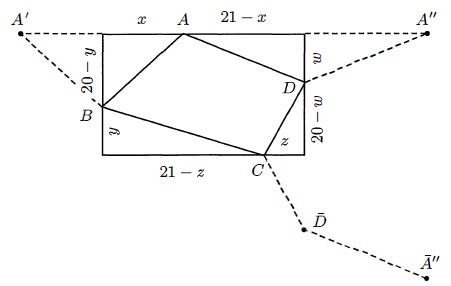SMO JUNIOR SECTION 2012 SOLUTIONS PART 6
Problem 18 :
Suppose x1, x2, .............x49 are real numbers such that
x12+ 2x22, .............49x492 = 1
Find the maximum value of x1+ 2x2, .............49x49
Solution :
x12+ 2x22, .............49x492 = 1
x1+ (√2√2x2)2+..........(√49√49) x492 = 1
1⋅1 x1+ (√2√2x2)2+..........(√49√49) x492 = 1
= (1 + 2 + 3 +...........+49) (x12+ 2x22, .............49x492)
Sum of natural numbers = n (n+1)/2
= [49(50)/2] ⋅ 1
= 49 ⋅ 25
= 1225
Problem 19 :
Find the minimum value of
√x2 + (20 -y)2 + √y2 + (21 - z)2 + √z2 + (20 -w)2 + √w2 + (21 - x)2
Solution :

AB = A'B, CD = CD', AD = A''D',BC = BC
AB + BC + CD +DA
= A'B + BC + CD + DA"
≤A' A" = √ 422 + 402 = 58
So, the minimum value is 58.
Problem 20 :
Let A be a 4 digit number. When both the first digit(left most) and the third digit are increased by n, and the second digit and fourth digit are decreased by n, the new number is n times A. Find the value of A.
Solution :
Let A = abcd, then
1000a + 100b + 10c + d
1st and 3rd digit increase by n and 2nd and 4th digit are decreased by n.
1000(a + n) + 100(b - n) + 10(c + n) + d - n = nA
1000a + 1000n + 100b - 100n + 10c + 10n + d = nA
1000a + 100b + 10c + d + (1000-100+10-1)n = nA
A + 909n = nA
909n = nA - A
909n = A(n-1)
If n = 2
909 x 2 = A(2-1)
A = 1818
Problem 21 :
Find the remainder when 1021I022 is divided by 1023.
Solution :
1021 is nearer to 1023
1021- 1023 = -2
= (-2)I022
= (2)I022
= (2)I022
= (2)I020 + 2
= ((2)I0)102 x 22
210 = 1024, dividing 1024 by 1023, we get 1 as remainder.
= 1102 x 4
= 4
So, the required remainder is 4.
Problem 31 :
How many triples of non-negative integers (x, y, z) satisfying the equation
xyz + xy + yz + zx + x + y + z = 2012?
Solution :
xyz + xy + yz + zx + x + y + z = 2012
Adding 1 both on both sides.
1 + x + y + z + xy + yz + zx + xyz = 2012 + 1
(1 + x) + (y + xy) + (z + zx) + (yz + xyz) = 2013
(1 + x) + y(1 + x) + z(1 + x ) + yz(1 + x) = 2013
Factoring (1+x), we get
(1 + x) (1 + y + z + yz) = 2013
(1 + x) [(1 + y) + z(1 + y))] = 2013
(1 + x)(1+y)(1+z) = 2013
(1 + x)(1+y)(1+z) = 3 x 11 x 61
If all x, y, z are positive, there are 3! = 6 solutions.
If exactly one of x, y, z is 0, there are 3 x 6 = 18 solutions.
If exactly two of x, y, z are 0, there are 3 solutions.
6 + 18 + 3 = 27
Problem 35 :
There are k people and n chairs in a row, where 2 ≤ k < n. There is a couple among k people. The number of ways in which all k people can be seated such that the couple is seated together is equal to the number of ways in which the (k - 2) people without the couple present, can be seated. Find the smallest value of n.
Solution :
k people is seated in n chairs and the couple to be seated together. So,
(n - 1)! ways and
2! (The couple themselves can change the position)
In n chairs 2 chairs should be ignored and in k people 2 people should be ignored.
(n - 1)! 2! (n - 2)C(k - 2) -------(1)
nC(k-2)-------(2)
Here √8k - 7 > 0
when k = 11
n = [4(11) -5±√8(11) - 7]/4
n = [44 -5±√81]/4
n = (39±9)/4
n = 48/4
n = 12
Recent Articles
-
Finding Range of Values Inequality Problems
May 21, 24 08:51 PM
Finding Range of Values Inequality Problems -
Solving Two Step Inequality Word Problems
May 21, 24 08:51 AM
Solving Two Step Inequality Word Problems -
Exponential Function Context and Data Modeling
May 20, 24 10:45 PM
Exponential Function Context and Data Modeling